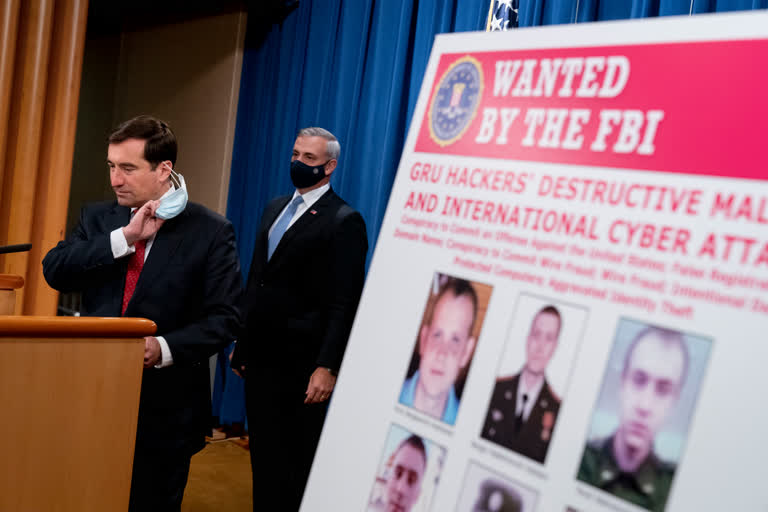Washington: The Justice Department announced charges Monday against Russian intelligence officers in cyberattacks that targeted a French presidential election, the Winter Olympics in South Korea and American businesses. The case implicates the same Kremlin unit that interfered in the 2016 US elections but is not related to the November vote.
The indictment accuses the six defendants, all said to be current and former officers in the Russian military intelligence agency known as the GRU, of hacks that prosecutors say were aimed at furthering the Kremlin's geopolitical interests and in destabilizing or punishing perceived enemies. All told, the attacks caused billions of dollars in losses and disrupted a broad cross-section of life, including health care in Pennsylvania, a power grid serving hundreds of thousands of customers in Ukraine and a French election that saw the late-stage disclosure of hacked emails.
The seven-count indictment is the most recent in a series of Justice Department prosecutions of Russian hackers, often working on behalf of the government. Past cases have focused on attacks against targets like internet giant Yahoo and the 2016 presidential contest when Russian hackers from the GRU stole Democratic emails that were released online in the weeks before the election.
The attacks, in this case, are “some of the most destructive, most costly, most egregious cyberattacks ever known,” said Scott Brady, the US Attorney for the Western District of Pennsylvania, where the 50-page indictment was filed.
“Time and again, Russia has made it clear: They will not abide by accepted norms, and instead, they intend to continue their destructive, destabilizing cyber behaviour," said FBI Deputy Director David Bowdich.
The indictment does not charge the defendants in connection with interference in American elections, though the officers are part of the same intelligence unit that prosecutors say interfered in the 2016 US election. One of the six charged in the case announced Monday was among the Russian military intelligence officers charged with hacking in special counsel Robert Mueller's investigation into Russian election interference.
Read more:Putin proposes yearlong extension of nuclear pact with US
The timing of the indictment was unrelated to the upcoming election in the US, said Assistant Attorney General John Demers. He said that despite ongoing warnings of Russian interference in the election, Americans “should be confident that a vote cast for their candidate will be counted for that candidate.”
The hacking targets described in Monday's case are diverse, with the indictment fleshing out details about attacks that in some instances had already received significant attention because of the havoc they had caused.
The indictment accuses the officers, for instance, of hacking into the 2018 Winter Olympics in South Korea after Russia was punished by the International Olympic Committee for a vast doping conspiracy. It also says the Tokyo 2020 Olympics were targeted. Those Olympics have been postponed until next year.
The Japanese government's chief Cabinet secretary Katsunobu Kato declined to comment on specifics. “We cannot overlook malicious cyberattacks that could shake the foundation of democracy," he said.
Tokyo 2020 in a statement said, “no significant impact has been observed in our operations." It said it has been taking “countermeasures” but declined to disclose them.
Prosecutors say the hackers unleashed a devastating malicious software attack during the opening ceremony in February 2018 that deleted data from thousands of computers related to the event and left them inoperable. Russia then tried to pin blame on North Korea in what prosecutors say was a failed 'false flag' attempt.
